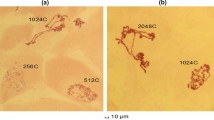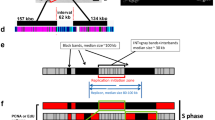Abstract
Exposure of Drosophila melanogaster larvae to high temperature for short periods of time results in marked changes in the puffing patterns of salivary gland chromosomes. Temperature shock “induces” puffing at 9 specific loci; this pattern of induced puffs shows little developmental specificity and is similar in three strains of D. melanogaster (including the mutant lethal giant-larvae) and in D. simulans. Temperature shock also (i) retards the regression of some developmentally specific puffs and (ii) results in the regression of all other puffs normal to development. The effect of temperature treatment is similar in vivo and after in vitro treatment of salivary glands. The in vitro response is not sensitive to cycloheximide. A similar pattern of induced puffs to that found after temperature treatment is found during recovery of larvae from anoxia, but additional puffs are “induced” after anoxia. The size and duration of activity of the induced puffs is dependent upon the magnitude of the treatment.
Similar content being viewed by others
References
Ashburner, M.: Patterns of puffing activity in the salivary gland chromosomes of Drosophila. I. Autosomal puffing patterns in a laboratory stock of Drosophila melanogaster. Chromosoma (Berl.) 21, 398–428 (1967).
—: Patterns of puffing activity in the salivary gland chromosomes of Drosophila. II. The X-chromosome puffing patterns of Drosophila melanogaster and D. simulans. Chromosoma (Berl.) 27, 47–63 (1969a).
—: Patterns of puffing activity in the salivary gland chromosomes of Drosophila. III. A comparison of the autosomal puffing patterns of the sibling species Drosophila melanogaster and D. simulans. Chromosoma (Berl.) 27, 64–85 (1969b).
—: Patterns of puffing activity in the salivary gland chromosomes of Drosophila. IV. Variability of puffing patterns. Chromosoma (Berl.) 27, 156–177 (1969c).
—: The genetic control of puffing in polytene chromosomes. In: Chromosomes today, vol. 2 (C. D. Darlington and K. R. Lewis, eds.). Edinburgh: Oliver and Boyd (1969d).
—: Function and structure of polytene chromosomes during insect development. Advanc. Insect Physiol. 7, 1–95 (1970).
Becker, H. J.: Die Puffs der Speicheldrüsenchromosomen von Drosophila melanogaster. I. Beobachtungen zum Verhalten des Puffmusters im Normalstamm und bei zwei Mutanten, giant und lethal-giant-larvae. Chromosoma (Berl.) 10, 654–678 (1959).
Beermann, W.: Chromomerenkonstanz und spezifische Modifikationen der Chromosomenstruktur in der Entwicklung und Organdifferenzierung von Chironomus tentans. Chromosoma (Berl.) 5, 139–198 (1952).
Berendes, H. D.: The induction of changes in chromosomal activity in different polytene types of cell in Drosophila hydei. Develop. Biol. 11, 371–384 (1965).
—: The hormone ecdysone as an effector of specific changes in the pattern of gene activities of Drosophila hydei. Chromosoma (Berl.) 22, 274–293 (1967).
—: Factors involved in the expression of gene activity in polytene chromosomes. Chromosoma (Berl.) 24, 418–437 (1968).
—, Holt, Th. K. H.: The induction of chromosomal activities by temperature shocks. Genen en Phaenen 9, 1–7 (1964).
—, Breugel, F. M. A. van, Holt, Th. K. H.: Experimental puffs in salivary gland chromosomes of Drosophila hydei. Chromosoma (Berl.) 16, 35–46 (1965).
Breugel, F. M. A. van: Puff induction in larval salivary gland chromosomes of Drosophila hydei Sturtevant. Genetica 37, 17–28 (1966).
Burdette, W. J., Anderson, R.: Puffing of salivary gland chromosomes after treatment with carbon dioxide. Nature (Lond.) 208, 409–410 (1965).
Clever, U.: Control of chromosome puffing. In: The control of nuclear activity (L. Goldstein, ed.). Englewood Cliffs: Prentice Hall 1967.
Ellgaard, E. G.: Gene activation without histone acetylation in Drosophila melanogaster. Science 157, 1070–1072 (1967).
Hadorn, E.: An accelerating effect of normal “ring glands” on puparium formation in lethal larvae of Drosophila melanogaster. Proc. nat. Acad. Sci. (Wash.) 23, 478–484 (1937).
Heslop, J. P., Price, G. M., Ray, J. W.: Anaerobic metabolism in the housefly. Musca domestica L. Biochem. J. 87, 35–38 (1963).
Ives, P. T.: Relocation of the or locus closer to pd. Dros. Inf. Serv. 42, 76 (1967).
Jefferson, G. T.: Heat injury to insects. Nature (Lond.) 156, 111–112 (1945)
Kroeger, H.: The induction of new puffing patterns by transplantation of salivary gland nuclei into egg cytoplasm of Drosophila. Chromosoma (Berl.) 11, 129–145 (1960).
Lindsley, D. L., Grell, E. H.: Genetic variations of Drosophila melanogaster. Carnegie Inst. Wash. Publ. 627, 1–472 (1968).
Mitchell, H. K., Mitchell, A.: Mass culture and age selection in Drosophila. Dros. Inf. Serv. 39, 135–137 (1964).
Ray, J. W., Heslop, J. P.: Phosphorus metabolism of the housefly (Musca domestica L.) during recovery from anoxia. Biochem. J. 87, 39–42 (1963).
Ritossa, F.: A new puffing pattern induced by temperature shock and DNP in Drosophila. Experientia (Basel) 18, 571–573 (1962).
—: New puffs induced by temperature shock, DNP and salicilate in salivary chromosomes of D. melanogaster. Dros. Inf. Serv. 37, 122–123 (1963).
—: Experimental activation of specific loci in polytene chromosomes of Drosophila. Exp. Cell Res. 35, 601–607 (1964).
-, Pulitzer, J. F.: Aspects of structure of polytene chromosome puffs of Drosophila busckii derived from experiments with antibiotics. J. Cell Biol. 19, 60A (1963).
Serfling, E., Panitz, R., Wobus, U.: Die experimentelle Beeinflussung des Puffmusters von Riesenchromosomen. I. Puffinduktion durch Oxytetracyclin bei Chironomus thummi. Chromosoma (Berl.) 28, 107–119 (1969).
Staub, M.: Veränderungen im Puffmuster und das Wachstum der Riesenchromosomen in Speicheldrüsen von Drosophila melanogaster aus spätlarvalen und embryonalen Spendern nach Kultur in vivo. Chromosoma (Berl.) 26, 76–104 (1969).
Welch. R. M.: A developmental analysis of the lethal mutant l(2)gl of Drosophila melanogaster based on cytophotometric determination of nuclear desoxyribonucleic acid (DNA) content. Genetics 42, 544–559 (1957).
Author information
Authors and Affiliations
Rights and permissions
About this article
Cite this article
Ashburner, M. Patterns of puffing activity in the salivary gland chromosomes of Drosophila . Chromosoma 31, 356–376 (1970). https://doi.org/10.1007/BF00321231
Received:
Accepted:
Issue Date:
DOI: https://doi.org/10.1007/BF00321231




